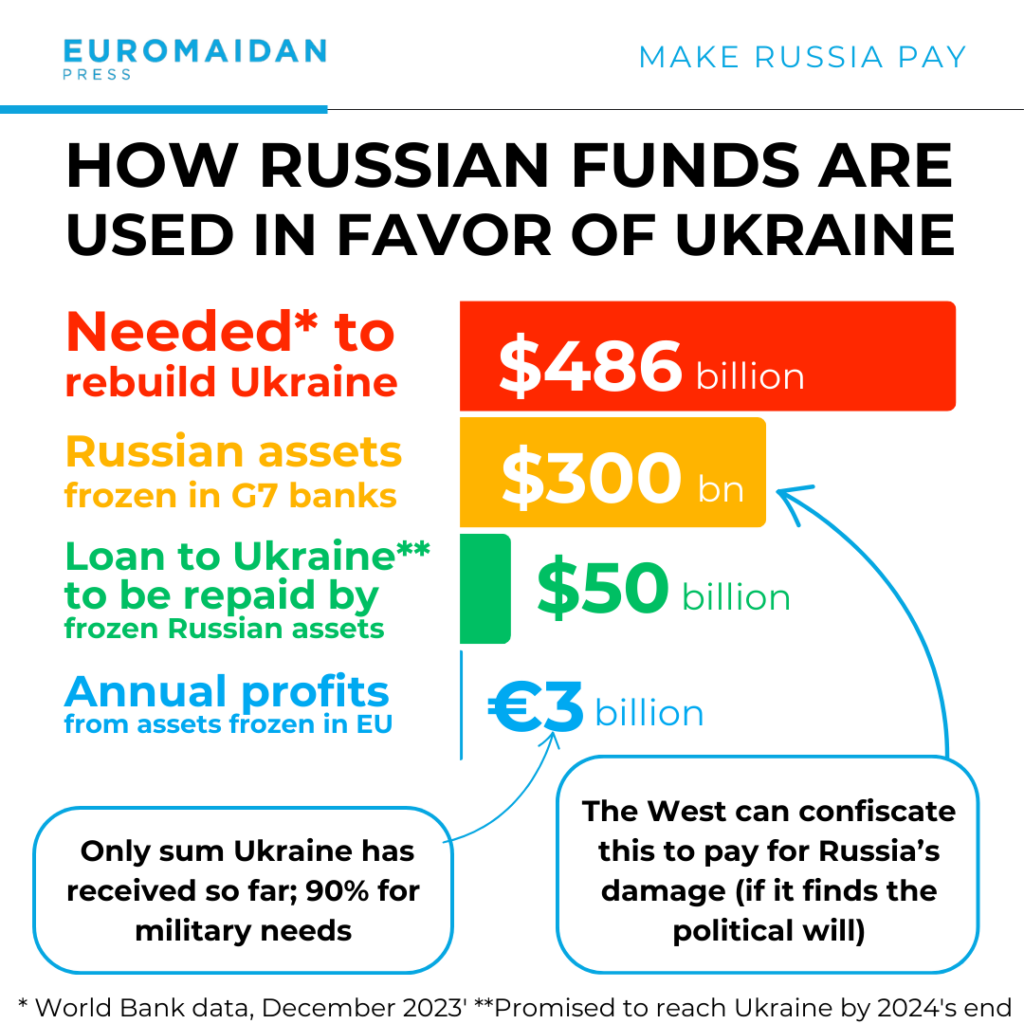Russia’s outrageous invasion of Ukraine has upset the post-World War II order and undercut the rule of international law, with profound effects on geopolitics and economics that are just now being felt. While authoritarian regimes are challenging democratic ones on a global scale, the most devastating effects have, of course, been felt in Ukraine. More than two years into the war, the country is fighting for its survival, not just militarily but also economically.
As the Ukrainian government continues to adapt its economy to the changing nature of the war, and begins the process of reconstruction, it is setting the parameters for all that will follow after the fighting has ended. Success now is linked to success after the war. But competing economic visions mean competing views about what should be done.
Some are pushing for Ukraine to join the ranks of countries that have embraced neoliberalism, meaning privatization and liberalization of not only trade, capital, and finance but also of labor markets (policies that once went under the rubric of the Washington Consensus).
Given Ukraine’s large debt, the argument goes, it will need to tighten its belt to repay what it owes, lest it risk the confidence of foreign investors, who hold the key to future success.
It is as if this discussion were happening 30 years ago.
Current theory and an overwhelming abundance of real-world evidence show that neoliberalism has been a colossal failure. Ukraine must look elsewhere.
Back then, plenty of mainstream economists still believed that such policies were sound, even though there was already extensive work demonstrating the weaknesses in the theoretical arguments for them.
In East Asia, countries that did not follow the neoliberal playbook had performed impressively, and mounting evidence from Latin America and Africa showed that countries that embraced the Washington Consensus often experienced deindustrialization, slow growth, episodic crises, and increasing inequality.
If it wasn’t obvious enough then, it certainly is now.
Current theory and an overwhelming abundance of real-world evidence show that neoliberalism has been a colossal failure. Ukraine must look elsewhere.
The nature of the challenge
As bad as neoliberalism is for economies in normal times, it is even worse for countries at war or undergoing the kind of transformation that Ukraine will face in the years ahead. The conventional price mechanism – which conveys information, provides incentives, and coordinates economic activity – performs uniquely poorly under wartime conditions. Time is of the essence, and the ability and willingness to pay may diverge sharply.
In fact, no government has ever conducted a successful war by adhering strictly to free-market principles.
Even in America’s recent “war” against COVID-19, political leaders turned to the Defense Production Act. This Cold War-era law gives the government substantial powers to intervene in markets to combat critical threats, and its past uses have included fixing prices during the Korean War, ensuring supplies of key raw materials, and regulating heavy industry.
Of course, a government-directed economy does not work. But we have too often erred in the other direction, relying on unregulated, ill-functioning markets even after doing so has led to dramatic economic failures.
Ukraine’s task will be to find the right balance. At the same time, since robust economic development is predicated upon military security, much of this discussion will be moot if Ukraine lacks the means to defend itself. Continued Western military aid therefore is crucial.
A government-directed economy does not work. But we have too often erred in the other direction, relying on ill-functinoning markets.
Beyond defense, the challenges Ukraine faces are distinct and complex, and they involve far more than just the reconstruction of physical infrastructure and bombed-out homes. When the war began, Ukraine still had not created all the institutional and legal infrastructure necessary for a well-functioning market economy. A market economy requires trust, but this was already weak during the Soviet era, and it was undermined further during the early years of the post-communist transition, which gave rise to an oligarchy that could take advantage of the rule of law in the West and ride roughshod over it in Ukraine.
The war has since destroyed not only physical capital but also human and natural capital. While Ukraine is known for its fertile soil, large parts of the land have been mined, and de-mining is slow and expensive. About 18% of Ukrainian territory and millions of people are under Russian occupation. The broader human toll is difficult to overstate.
Ukraine has suffered large labor displacements with the departure of many women and children (6.5 million, by some estimates) and the military deployment of at least 700,000 fighting-age men. There are concerns that Ukraine will emerge from the war with a large gender imbalance, which could have long-term social and economic repercussions.
Some reasons for hope
Wars can have a transformative effect on societies, especially if wartime governments keep an eye on the post-war economy they hope to achieve.
In the case of the United States, each world war produced systematic and lasting changes, and compelled the government to address the consequences of the social iniquities of the time. The introduction of school meal programs, for example, was motivated partly by the need to ensure that the population was physically prepared for what might await. Military recruits provided shocking proof that many Americans were not receiving the nourishment they needed to lead healthy, productive lives.

WWII was pivotal in driving America’s transformation from a predominantly rural, agrarian society to an urban, industrial economy. The GI Bill helped ensure that (almost) everyone received as much education as they would benefit from, and the war-driven increase in female labor-force participation changed the economics of gender.
The major technological advances that the war induced – in telecommunications, aeronautics, and other domains – would go on to revolutionize all economies and societies.

Ukraine, for its part, will have several advantages as it looks to transform itself after the war.
The large cohort of Ukrainian citizens who have spent extensive time outside the country will be able to send back not only financial remittances but also valuable knowledge and knowhow. Moreover, Ukraine’s accession to the European Union will force an overhaul of its legal and institutional infrastructure.
Though these changes will not guarantee long-term democratic consolidation (as Hungary has shown), studies indicate that EU accession is among the most important factors determining post-communist performance.
EU accession is among the most important factors determining post-communist performance.
Ukraine also should have a competitive edge in many of the sectors that will drive future growth globally. Its workforce is well educated, flexible, and very inexpensive. Pay varies by region and industry, but the average monthly salary is only about $500 per month, with the highest monthly salaries (in Kyiv’s information-technology sector) ranging from $1,000 to $2,600.
Finally, there is one important (perhaps uniquely) Ukrainian phenomenon that bodes well for the future. In the wake of the 2013-14 Euromaidan protests and Russia’s subsequent invasion and illegal annexation of Crimea, Ukrainian civil society experienced a renaissance.
Colloquially, Ukraine survived because of two groups of people:
- the volontery who willingly offered their time, expertise, or money,
- the dobrovoltsi (“people of good will”) who volunteered for the uniformed services.
The volontery networks operate on trust, which economists recognize to be a major component of development. Implicit norms are as necessary for growth as are explicit, enforceable laws, and the academic literature is full of examples of how, both historically and in experimental settings, trust facilitates welfare-increasing interactions that would not be possible otherwise.

Repeated, transparent interactions make it easier to overcome barriers to mutually beneficial cooperation. Ukrainians are already promoting fundraisers on social media, providing in-kind donations, driving goods hundreds of miles, and working on recovery initiatives.
These volontery networks – domestic and diaspora – may be crucial to ensuring that the government policies we propose below ultimately succeed.
The solidarity and trust fostered during the fight for democracy in WWII contributed enormously to the subsequent quarter-century of rapid, shared growth in Europe and the US. The same could be true for Ukraine—provided it mobilizes these resources, ensures that the burden of the war is shared fairly, and provides equitable opportunities during the recovery process.
Solidarity and trust forged in WWII contributed to post-war economic growth in Europe and the USA
Financing the recovery
While Ukraine’s war expenditures remain urgent, its typical revenue sources have dried up. Notwithstanding the unprecedented support Ukraine has received from many in the international community, its financing challenge is a long-term one, and most of the elements that it will need to succeed must be put in place today, by Ukrainians themselves.
To finance reconstruction, Ukraine should be able to avail itself of the Russian assets that are frozen in the US and Europe. Europe’s current position on this issue makes no sense. It seems to believe that Russia should be able to violate international law by invading its neighbor, yet still enjoy full property protections under Western laws.
But never mind that the rule of law does, in fact, permit Russian assets to be put toward Ukrainian reconstruction; even the $300 billion in frozen Russian central-bank reserves will not be enough.

A comparison of the amount of Russia's assets frozen in Western banks and the damages Russia caused to Ukraine. Infographics by Euromaidan Press. Source
The West also will need to provide more generous financial support. Westerners should recognize that this is a small price to pay to counter the threat that Russia’s war represents. Though we have been engaged in a great battle, we have not had to send any troops. To keep it that way, we must continue to provide as much aid as is necessary for Ukraine to win (which is different from merely not losing) the war.
Part of this assistance must take the form of debt relief because there simply is no way that Ukraine can repay all that it owes. We know from bitter experience that you cannot squeeze water from a stone.
Austerity policies geared toward eking out a little more for creditors inevitably fail and often leave both the creditor and the borrower worse off. The interest rates charged by the International Monetary Fund, official creditors, and private lenders should be substantially reduced to a level consistent with a financially sustainable path.
Since Ukraine will need to be able to self-finance to a significant degree (it would be a mistake to rely too much on foreign investment), boosting its domestic savings rate also will be important. But this will require a government committed to economic stability, as well as many safe, diversified, low-cost places for people to put their money. And that, in turn, requires a mix of well-regulated private, cooperative, and public financial institutions.
Striking the right balance
A twenty-first-century economy requires a balance between government, markets, and civil society.
Neoliberalism was wrong to put the private sector on a pedestal. Aggressive privatization proved not to be a panacea, and it has often gone awry. While many of Ukraine’s state-owned enterprises are dysfunctional and corrupt, a mishandled privatization process would introduce other risks.
A hastily conducted privatization risks "re-oligarchizing" Ukraine.
Many of the post-communist privatizations were marked by corruption and ultimately enriched oligarchs (hence the nickname briberization). An ideologically motivated policy of “privatization for privatization’s sake” often results in assets being sold far below their value, which amounts to giving away rents to the buyers and surrendering economic (and possibly political) power.
In Ukraine’s case, a hastily conducted privatization during wartime may buttress the waning power of existing oligarchs (some of whom have lost substantial assets and are eager to regain their lost status); there is a risk that it would “re-oligarchize” the country, undermining not only its economic efficiency and dynamism, but also its democracy.
Government policy should instead seek to encourage competition and limit market power.
Ukraine’s current Prozorro procurement system is admirably transparent, but it cannot provide any defense against collusion by bidders. Fortunately, modern economic theory may help here.
There is now ample literature on collusion-proof auctions, and economists have identified a multitude of tools that could improve privatization outcomes, including better tenders (ensuring that the government gets the full value of the assets sold) and oversight mechanisms.
The most important tools may be an enforceable commitment to repossess the assets and impose significant penalties if they are not used in the way promised.
Finally, there is a potential role to be played by public-private partnerships – a middle ground between the inefficiency and corruption of state-owned enterprises and the inefficiency and corruption of the private sector. But these partnerships must be carefully designed: too often, such arrangements have meant the private sector reaps the gains and the public sector bears the losses.
In any case, the Ukrainian government will have to play a central role in any reconstruction process. It should use the international aid the country receives to rebuild and restore the physical, human, and natural capital destroyed by the war, especially transportation, health, education, and climate infrastructure.
The government’s role in other domains is less obvious, but just as important. For example, to ensure that refugees can return safely, the housing stock will have to be rebuilt. Here, Ukrainian planners can learn from others’ experiences, both successes and failures – from Vienna’s successful public housing scheme to many US cities’ failure to manage their homeless populations. The best approach will be a two-pronged strategy, with both public and private initiatives.

One of the fundamental goals of public policy should be to create an economy that delivers long-term growth and shared prosperity. To succeed, the government must design the rules of the game to ensure fairness and efficiency and to prevent exploitation. That means guiding and shaping competitive markets through credible regulation and appropriate digital, innovation, and intellectual-property policies.
Having experienced communism, many in Ukraine will be tempted to go to the other extreme - to let markets rip. This would be a grave mistake
While many of these areas will be covered by the acquis communautaire – the enormous body of European law that Ukraine will adopt in the course of its EU accession negotiations – Ukraine should start focusing on them immediately. EU membership negotiations can take many years, and even within the EU framework, governments may exercise enormous discretion.
In doing so, Ukrainians should bear in mind the failure of neoliberalism. Having experienced communism’s overweening effort to control every aspect of life, many will be tempted to go to the other extreme – to let markets rip. That would be a grave mistake.
Play to your strengths
Now that young Ukrainians have earned a reputation around the world for their technical skills, Ukraine can become embedded in the global digital economy, especially if the government supports infrastructure investment, high-quality technical education, and research.
The diffusion of technology (as opposed to its creation) is likely to play a pivotal role in the country’s economic future. Ukraine may be ahead when it comes to some technologies – not least those involving defense – but it is still playing catch-up in other areas.
Looking further ahead, the EU single market – with its free movement of people, goods, capital, and ideas – will be an important source of growth. While the Deep and Comprehensive Free Trade Area (which entered into force in 2016), and the Association Agreement (2017) provide some pre-membership benefits, more can be done to deepen EU-Ukrainian economic integration well before Ukraine’s official accession.
As industrial policy comes back into vogue around the world, Ukraine should pursue “managed trade,” as many of the most successful developing countries have done.
For example, instead of auctioning off licenses for lithium mining rights, as Ukraine was in the process of doing in 2021 and 2022, the government might instead insist on local production of lithium-ion batteries. The same goes for other Ukrainian rare earths and critical raw materials (titanium, zirconium, and non-ferrous metals).
Not only is the world undergoing an energy transition, but Western democracies are trying to ensure that authoritarian regimes do not gain monopoly control over critical components of the supply chain. That gives Ukraine a strong bargaining position.
Ukraine could have a strong bargaining position if it launches the local production of lithium-ion batteries.
In addition to exporting raw materials and agricultural products, Ukraine should develop local industries that produce higher value-added intermediate and final goods. While the era of export-led growth may be over, Ukraine can still compete – or even demonstrate a comparative advantage – in some advanced industries (information technology, defense technology, agriculture, certain medical and dental services, entertainment and culture, and design and fashion).
Place-based industrial policy – that is, strategies that take advantage of unique local strengths and opportunities – can play an important role both in winning the war and creating the conditions for a full recovery.
Local institutions and local insights will be key to the broader reconstruction process. If and when international funds arrive, it is Ukrainian bureaucrats who will spend the money. That is as it should be.
One commonly cited reason for the Marshall Plan’s success is that it was decentralized; an important corollary of this is that Ukraine must improve local institutional capacity and transparency.
The imperative of assistance
The uncertainties associated with how the security situation will play out constitute a massive impediment to reconstruction and rehabilitation, and markets will not provide the necessary insurance. That makes it imperative that the Ukrainian and Western governments step in and provide insurance against these security risks, and possibly even against their macroeconomic consequences.
While here we have suggested a framework for Ukraine’s economy, its economic prospects and its security are intertwined. Reducing military insecurity would obviously have enormous economic benefits, and nothing might do more in this respect than Ukraine quickly joining the EU and NATO. As NATO celebrates its 75th anniversary, nothing would be more emblematic of its values than laying out a path toward membership. (Of course, many other factors go into those decisions.)
With sufficient assistance from the West, Ukraine will prevail over its much larger and richer authoritarian neighbor. To secure that victory, and to enjoy the fruits of what victory might bring, Ukraine will have to move faster in its transition from a post-communist oligarchy. But it will succeed only if it rejects the failed neoliberal capitalism that dominated the past half-century.
Copyright: Project Syndicate. This article was published by Project Syndicate and has been republished by Euromaidan Press with permission.
Editor's note. The opinions expressed in our Opinion section belong to their authors. Euromaidan Press' editorial team may or may not share them.
Submit an opinion to Euromaidan Press
Related:

